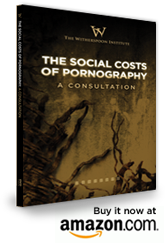"The Witherspoon Institute chronicles the mounting evidence from social and neuro-science of pornography’s deep impact on our social life. No, it’s not just a private matter. The Social Costs of Pornography should make even laissez-faire skeptics view our internet-fueled pornocopia as a subject for serious debate."
Kay Hymowitz
Senior Fellow at The Manhattan Institute Contributing Editor of City Journal
FAQ
-
Q: What is the genesis of this statement?
-
A:
The Social Costs of Pornography: A Statement of Findings and Recommendations grew out of a conference held at Princeton University on December 11-13, 2008, sponsored by the Witherspoon Institute and the Institute for the Psychological Sciences of Arlington, Virginia. The conference was called in the conviction that pornography had re-emerged in the age of the internet as a serious social problem, and in the hope that modern scholarship had something new to say about it. A companion volume of the edited papers from that conference will appear later this spring under the title, The Social Costs of Pornography: A Collection of Papers. The Statement was drafted after the conference and circulated among several of the participants. Last summer it was circulated more widely among scholars, who were invited to sign, and was often refined in the process.
-
Q: Who are the signatories?
-
A:
The signatories are scholars from a variety of fields and viewpoints, from medicine and psychology to law and political science. Some are liberal in their politics, some conservative. Some would identify themselves as feminists, some as traditionalists. Some are practicing members of a religious faith - Protestants, Catholics, Jews, and Muslims are all represented - while others are secular in orientation. We share a sense of the reality and seriousness of the problem of pornography today, although - as expressed in the Statement - we differ concerning some of the policy recommendations we have raised.
-
Q: Isn't pornography protected by the First Amendment?
-
A:
In a series of cases decided since the middle of the twentieth century, the Supreme Court has narrowed the definition of what counts as obscene, and society has simultaneously grown more permissive regarding explicit portrayals of nudity and sex in magazines, in film and on television. Nevertheless, material that meets the Court's definition of obscenity - that appeals to the prurient interest, that is patently offensive, and that lacks serious artistic, social, or scientific value - can be suppressed, while material deemed indecent though not obscene can be regulated as to the time, place, and manner of its availability. There is little question that hard-core pornography does not receive constitutional protection, even though many jurisdictions now permit its dissemination.
-
Q: Isn't pornography use a private matter which society has no business interfering with?
-
A:
When private behavior has social consequences, it is a matter of social concern, even if the best way of addressing it does not involve government action. Society certainly has an interest in the public environment of its communities; it has an interest in the education of its young and in insuring that they grow to be mature citizens who contribute to the community's life and its welfare. When private action has consequences for society beyond the individual, the public has an interest in understanding the problem and in finding ways to address it. We think our Statement shows that pornography use clearly has consequences that affect others besides the user in detrimental ways. Like smoking and even more like illegal drugs, it not only harms the individual, but has harmful effects on those around him. Although in one case in the 1960s the Supreme Court ruled that the mere possession of obscene materials in the home was beyond the reach of the law, it did not even then license trafficking in obscenity or the production of obscene photographs or films, and of course the justices in that case did not then have access to more recent evidence about the social effects of private use. Besides, people should know about the effects of pornography use if only to be able to counsel friends and loved ones, even where government never gets involved.
-
Q: Isn't the pornography addiction really just a matter of poor self-control?
-
A:
Do you think heroin addiction is just a matter of self-control? Certainly we can bring selfcontrol to bear in curbing the problem but that is not enough. Certainly people are responsible to the decisions they make but as with any psychiatric disorder there may be a need for extra help, support and treatment to reduce the impact of the disorder and be able to implement better decisions. As with other material that is damaging and/or addicting (e.g., cocaine, cigarettes, alcohol) it is not a matter of "Just say no".
-
Q: With respect to the recommendation that therapists cease using pornography for counseling and treatment purposes:
- Is it really ethical to limit a therapist's treatment choices?
- Would you apply this to sex manuals that a counselor recommends to married couples on the brink of divorce?
-
A:
Therapists already expect that there are number of laws that control what they can and cannot do; what they must do legally. In addition, the professional licensing boards and the ethical requirements imposed by the professional organization also control what therapists can and cannot do. There are a number of laws and professional rules such as the duty to warn, the duty to report, laws that limit and control confidentiality, laws that limit and control who can call themselves a "psychologist", laws that require certain therapeutic behaviors if the therapy is paid for by the government and insurance requirements.
In the American Psychological Associations Ethics Guidelines, the first coda is "irst do not harm". Educating the field as to what is harmful is an advantage to the field. Sex therapists years ago used to use what were called "sex surrogates" to help individuals with sexual problems until it was pointed out that this was prostitution. So they stopped.
True sex manuals can give accurate information about sexuality without using images that are sexually arousing. They can teach sexual techniques without using images of sexual abuse survivors who are re-enacting their trauma. We can teach couples how to arouse each other and how to arouse themselves without engaging in this harmful behavior.





